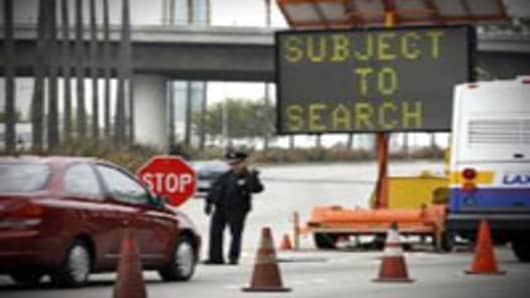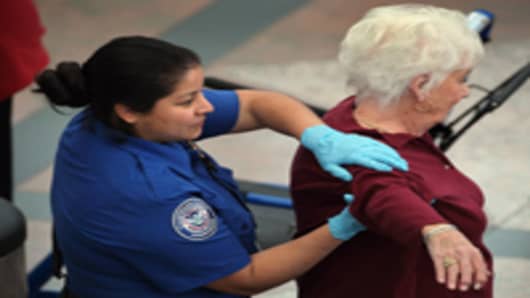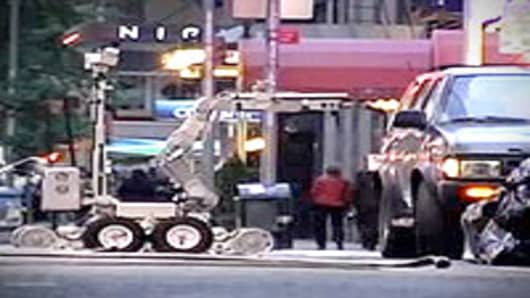Without a direct terror strike on the U.S. homeland, and with the death of Osama Bin Laden, it might be easy to assume America is a safer nation since the 9/11 attacks.
But anyone who believes the U.S. is smothered in a blanket of security does so, analysts say, with more hope than certainty.
"I'm skeptical of anyone who can answer the question 'Are we safer?' with a simple yes or no," said Ward Thomas, a national security expert and professor at the College of Holy Cross. "We are better in some ways, but not necessarily in others."
"We created a whole government department, Homeland Security, but regrettably, we are probably not safer," said Darren Hayes, a professor at Pace University and an expert in computer forensics and security. "There is still much work to be done."
We know what has been done over the past 10 years. Including the costs of wars in Iraq and Afghanistan, an estimated $1.8 trillion has been spent on various security measures since Sept. 11, 2001, according to a recent Congressional Research Service report.
Besides the much publicized tightening of airport security, the money has been used to beef up the number of security officers, increase local police terror training, as well as purchase health-care supplies and rescue equipment across the U.S.
A less-visible and less-expensive security gap on 9/11 has also been addressed, say analysts. "The agencies that comprise our intelligence community—the FBI, CIA and others—are working together much more effectively, and trading information and watch lists," said Benn Prybutok, adjunct associate professor of Homeland Security at Drexel University. "That didn't happen before. We also have greater international cooperation."
That cooperation, analysts contend, has prevented plots, such as the one in Great Britain, where police in 2010 intercepted a toner cartridge with explosives bound from London to Chicago.
Intelligence apparently led the FBI to arrest a 22-year-old man who allegedly placed a backpack on a crowded Chicago street corner, also in 2010.
It's estimated that nearly 30 terror plots have been uncovered over the last 10 years.
"Nine-eleven forced changes that made the U.S. much safer in terms of intelligence gathering," said Ed Hammersla, COO of Ratheyon Trust Computer Solutions, a supplier of cyber security solutions for the government and private industry.
On the ground, the U.S. is much better prepared to handle a terror attack, if one happens, said Susan Cherry, a nurse and clinical instructor in the University of Texas, Arlington, College of Nursing.
"The 9/11 attacks woke up the health-care systems, as did Hurricane Katrina (in 2005)," said Cherry, who was director of emergency preparedness at USMD Hospital in Arlington, Texas, from 2001 to 2006.
"The major shift has been from disaster preparedness to disaster management," explained Cherry. "There's more advanced planning and training now to handle patients. Plus, we have better health-care equipment, including drugs and vaccines to fight biological attacks."
Other first responders are also in a better position to save lives, said Dennis Martinez, CTO of Harris PSPC, a leading supplier of communications and equipment for public safety.
"More firemen and police today are better able to communicate with each other because the technology has been updated," Martinez said, noting the deadly confusion rescuers dealt with as they struggled to talk to each other in the World Trade Center Towers on Sept. 11, 2001.
"They were all on different frequencies, and now most systems are interconnected," explained Martinez.
While analysts point to improvements, there are still troubling security threats.
Remaining Threats
"We've got more than 1,000 nuclear reactors, and 15,000 chemical plants refineries and hazardous material sites in the U.S., with many near major population centers," said Jeff Addicott, director of the Center for Terrorism Law at St. Mary's University School of Law. "An attack on one of these would have death tolls in the thousands."
The botched plot of the New York Times Square bomber in 2010 is proof that the intelligence community still has limits, said Darren Hayes.
"It was the quick thinking of some street vendors who notified the (New York Police Department) in that case," said Pace University's Hayes, who believes more money, not less, should be spent on security.
"It's ironic that at this time many state and local governments, as well as the federal government, have cut back on law enforcement funds due to the bad economy," Hayes went on to say. "It's the wrong direction."
"We've got to do more to address the growing threat of cyber terrorism," added Addicott of St. Mary's University. "We need more resources all around and try to stop the plots before they occur."
The U.S. must also rethink its foreign policy, said security expert Thomas, who has written several books on the subject.
"I doubt very much if the wars in Iraq and Afghanistan have made us safer," Thomas explained. "Al Qaeda is a shadow of its former self, but other groups have adopted its philosophy."
There's also the question of whether America is still secure in its democratic freedoms. Critics say the Patriot Act—signed into law after the 9/11 attacks—is a sign the U.S. has given up more than it should to terrorists.
Among the act's measures, it dramatically reduced restrictions on searches for telephone, e-mail communications, medical and financial data, and other records. It also eased restrictions on foreign-intelligence gathering within the U.S.
"We've created too many dragnets with excessive surveillance and expansive criminal laws, and intrusive security systems," argued Susan Herman, president of the American Civil Liberties Union. "The 9/11 attacks were so frightening, it led many Americans to believe we needed to modify our laws and compromise our rights in order to be safe."
"The Patriot Act sought to provide better protection, but are the borders safer? Probably not," said Pace University's Hayes. "Just look at Mexico and the illegal drugs and weapons that come in to the U.S."
Others say the legal changes were overdue.
"The act provided a firm base through which investigative methods and other tools caught up with 21st century technology," argued Drexel University's Prybutok. "This has been achieved without wholesale violence to our civil liberties."
Whatever their faults, have the Patriot Act and other security measures been effective? Why hasn't there been a successful attack against the U.S. homeland since Sept. 11, 2001?
"It's impossible to answer that question," said Thomas, a security expert. "It's hard to know what's worked and what hasn't. It's likely due to some combination of all the efforts—along with some plain luck."
News reports say that before he was killed, Osama Bin Laden was assembling a team of militants to attack the U.S. on the 10th anniversary of 9/11, according to communications seized from his Pakistani hideout.
Analysts said this indicates more terrorist attacks are at least in the planning stage—both home-grown and overseas.
"There are predictions that radical groups of some kind will employ weapons of mass destruction in a terror attack somewhere in the next year," said St. Mary's University's Addicott. "This struggle will last for generations."
While Americans may wonder if, or when, the next attack will come, analysts say the fear of terror itself is now a permanent legacy.
"The significance of 9/11, beyond the terrible destruction, was the sense of vulnerability it left," said Drexels University's Prybutok. "Anyone passing through an airport knows the changes that have been made in our daily lives. We know we can be attacked. We'll never be what we were before 9/11."






